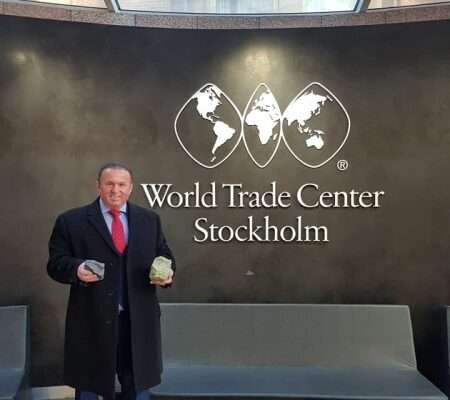

The meteoric rise in gold prices can be attributed, in part, to robust demand from major consumers, notably China and India. In the preceding year, China’s gold consumption reached a staggering 630 tonnes, while India’s consumption was a formidable 562 tonnes. This underscores gold’s profound cultural significance, especially amid the grandiose celebrations and weddings that characterize the summer festivities of the Indian subcontinent.
Gold investment, a paragon of financial prudence, transcends cultural and generational boundaries. From its humble valuation of $20.69 per ounce in 1924 to its awe-inspiring peak of $2,633.50 at present, gold has undergone an extraordinary metamorphosis, reflecting an over 130-fold increase in value. For me, embarking on the journey of gold trading three decades ago marked the inception of an enduring fascination, as this resplendent metal seamlessly integrated into the fabric of my daily life. My passion is fueled by the constant monitoring of market dynamics, including price volatility, production trends, geological reserves, and geopolitical intricacies.
The Allure of Gold
The allure of gold for investors is multifaceted, anchored in its timeless reputation as a store of value. In an era marked by economic turbulence and inflationary pressures, gold provides a reliable sanctuary, offering not only protection but also the potential for diversification. Its minimal correlation with conventional assets, such as equities and bonds, fortifies portfolio resilience, making it an indispensable element of prudent investment strategy.
As fiat currencies face depreciation, gold’s value often ascends, serving as a bulwark against inflation and the erosion of purchasing power. Additionally, in times of geopolitical unrest or financial crises, gold emerges as a safe haven, bestowing a sense of security amidst the uncertainty that pervades global markets.
In the radiant tapestry of green energy’s emergence, where innovation dances with nature’s whispers, gold stands as a luminous thread, intertwining beauty and utility. This precious metal, with its unmatched conductivity and enduring resilience against the ravages of time, embodies the very essence of sustainability.
In Solar Panels: Imagine the sun’s golden rays, caressing solar cells with warmth and possibility. Here, gold plays a pivotal role, crafting connections within thin-film technologies that capture light with remarkable grace. As it enhances efficiency, gold becomes a silent sentinel, transforming sunlight into electricity, bridging the gap between celestial brilliance and earthly needs. Each solar panel, a canvas of hope, glistens with golden veins, symbolizing a future where energy is drawn from the very heart of the cosmos.
In Batteries: Dive deeper into the realm of energy storage, where gold nanoparticles twinkle like distant stars in the night sky. These minuscule marvels elevate battery performance, enhancing charge storage and enabling a symphony of power that echoes in every home and electric vehicle. Here, gold transforms mere potential into kinetic energy, embodying the spirit of progress and the promise of a world fueled by clean power.
In Fuel Cells: Consider the fuel cell, a marvel of engineering, where chemical energy gracefully transforms into electrical flow. Gold acts as a catalyst, its intrinsic properties igniting efficiency with the lightest touch, facilitating the alchemical dance that fuels our aspirations for a cleaner tomorrow. In this sacred space, gold is not merely a metal; it is an enabler of dreams, a bridge from aspiration to realization.
In Electronics: As we traverse the intricate pathways of modern technology, gold’s reliability shines brightly. It weaves through the very fabric of electronic components in renewable energy systems, forming connections that stand the test of time. With every wire and every circuit, gold ensures that our advancements are not fleeting but enduring, like the golden rays of dawn heralding a new era of sustainability.
While gold may not be as abundant or easily accessible as other materials, its unique properties grant it a place of honor in the realm of green technologies. It symbolizes not just value but the very essence of progress, an emblem of the harmony we seek between humanity and the earth. In the quest for a sustainable future, gold emerges not merely as a resource but as a beacon of hope, guiding us toward a world where energy is clean, efficient, and harmoniously intertwined with the natural world. Each glimmer, each sparkle, reflects our commitment to innovation and our reverence for the environment, reminding us that the path to a brighter tomorrow is paved with both ingenuity and care.
The Dynamics of Supply and Demand
The trajectory of gold is intricately tied to the dynamics of supply and demand. The limitations inherent in gold supply, coupled with the high costs associated with its extraction, contribute to an enduring upward price trend. Beyond its role as an investment, gold finds itself woven into the very fabric of various industries. Its exceptional conductivity renders it indispensable in electronic components, while its biocompatibility underscores its value in dentistry. In the realm of medicine, gold nanoparticles possess transformative potential in drug delivery and imaging techniques, and in aerospace, gold’s reliability is cherished in spacecraft components.
A Surge in Production
Recent years have witnessed a surge in gold production globally, spurred by investments in cutting-edge technology, automation, and the integration of artificial intelligence. The appetite for gold remains substantial, with mine production experiencing a modest uptick of 1% in 2024, culminating in a total output of 3,644 tonnes in 2023, just shy of the record set in 2018. This burgeoning production is driven by some of the foremost mining entities, including Newmont Corporation, Barrick Gold Corporation, AngloGold Ashanti, Kinross Gold Corporation, and Newcrest Mining Limited, all of which consistently rank among the elite producers on the global stage.
However, the fluid nature of production levels remains subject to a myriad of influences, including fluctuations in ore grades, operational efficiencies, and prevailing market dynamics.
Navigating the Risks
While the allure of gold investment offers diversification and protection against inflation, it is imperative to consider the inherent risks. Gold’s value hinges solely on price appreciation; unlike rental properties or dividend stocks, it does not generate ongoing cash flow. Moreover, gold prices can exhibit high volatility.
The secure storage of physical gold incurs expenses that may diminish potential returns, and liquidating substantial quantities of physical gold can be both costly and logistically challenging. Critics often highlight the susceptibility of the gold market to manipulation, which can exert undue influence on prices.
Gold’s value is intrinsically subjective, driven more by demand than by any inherent worth. This may necessitate forgoing potentially higher returns from other assets. Thus, before embarking on a gold investment, it is crucial to meticulously assess your objectives, risk tolerance, and diversification needs. While gold possesses numerous benefits, weighing its drawbacks against potential gains is essential for making informed decisions.
Strategic Considerations for Investors
Investing in gold demands a nuanced approach. Whether one chooses to engage through physical gold, ETFs, mining equities, or futures contracts, alignment with investment objectives, market conditions, risk tolerance, diversification strategies, and cost considerations is paramount. A well-defined investment plan allows investors to incorporate gold into their portfolios with confidence, adeptly navigating the complexities of the market.
Determining the optimal portion of your portfolio devoted to gold requires a comprehensive analysis of several factors:
- Investment Objectives: Contemplate whether your goal is wealth preservation, portfolio diversification, or safeguarding against inflation and geopolitical risks. Your investment aims will dictate the role gold plays in your portfolio.
- Risk Tolerance: Assess your comfort level with risk. While gold is often regarded as a stable asset, its price can still fluctuate significantly. A preference for stability might prompt a larger allocation to gold.
- Time Horizon: Consider your investment timeline. Longer time horizons may allow for greater resilience to short-term fluctuations in gold prices compared to those with shorter investment horizons.
- Diversification Strategy: Recognize gold’s potential to enhance portfolio diversification. Evaluate how gold interacts with other asset classes, such as stocks, bonds, and real estate, to mitigate overall portfolio risk. Stay informed about market dynamics, including inflation, interest rates, currency fluctuations, and geopolitical events, adjusting your gold allocation as needed.
Seeking guidance from financial experts can further refine your strategy. While recommendations vary, many suggest allocating between 5% and 10% of a diversified portfolio to gold and similar assets. Nonetheless, it is crucial to tailor this allocation to align with your specific financial circumstances and preferences.
Ultimately, the allocation of gold within your portfolio should harmonize with your financial situation, objectives, and risk tolerance. Regular monitoring and adjustments will allow you to remain responsive to evolving market conditions, ensuring that your investment strategy remains robust and relevant. In this luminous landscape of opportunity, gold continues to shine as a beacon of both wealth and wisdom, inviting discerning investors to embrace its timeless allure.
Sahit Muja
New York















































